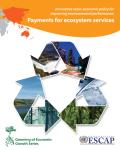Financial constraints are among the most important barriers to proper municipal solid waste (MSW) management in the developing countries of Asia and the Pacific. The reform of fiscal measures and the adoption of economic instruments could help local governments by increasing revenue, causing MSW management authorities in the region to attempt to recover costs by levying fees for their services. However, the polluter pays principle is not easy to enforce in countries where the population has never paid the actual cost of public services aimed at mitigating environmental damage. Since it directly affects their available income, local people often do not understand why they should pay for these services while at the same time, rising public awareness of environmental issues is making it more difficult to implement low-cost solutions, such as the creation of new disposal sites. The fermentation of waste in open dumps and landfills generates landfill gas (LFG), a major component of which is methane, a powerful greenhouse gas (GHG). Proper management of MSW which includes utilizing this LFG, can thus contribute to climate change mitigation.

For an economy to “grow green”, investments must be made in natural capital. Natural capital provides both “direct” ecosystem services such as the provision of food and raw materials, and “indirect” ecosystem services such as carbon sequestration, watershed protection, aquifer recharge and biodiversity habitat provision. Ecosystem services support human economies and societies. They are usually irreplaceable, or can only be substituted for at great cost. The savings achieved by protecting natural capital can provide convincing economic, in addition to the well-known environmental arguments, for sound environmental management. Incentives for sustainable management of ecosystems through payments for ecosystem services (PES) can boost action on sound ecosystem management.
Energy poverty - lack of access to electricity and reliance on traditional fuels for cooking and heating - remains an enduring problem. Globally, more than a billion people live without electricity and, nearly three billion depend entirely on wood, charcoal and dung for other domestic energy needs. Their search for energy fuels and services is an arduous, daily grind. Lack of access to modern energy has a broad impact. It not only limits economic opportunities for income generation and blunts efforts to escape poverty; but it also severely impacts living conditions for women and children and contributes to global deforestation and climate change. In a business-as-usual scenario, by 2030, the estimated number of deaths from dependence on traditional fuels will likely be greater than those individually from malaria, tuberculosis and HIV/AIDS, underscoring the necessity of finding more sustainable forms of energy supply.
Advancing Sustainable Energy was prepared for the occasion of the Asian and Pacific Energy Forum (APEF) as an up-to-date catalogue of UN-Energy Asia-Pacific - its members, case studies and an assessment of member organizations' perspectives on enhanced energy security. ESCAP is the secretariat for UN-Energy Asia-Pacific, a part of the global coordination group UN-Energy. 10 members participated in the questionnaire to gather information for this publication. Stakeholders, especially in member States, can read this booklet to get the most comprehensive one-stop understanding of the vision, strategy and activities of ADB, ESCAP, FAO, UNCCD, UNCDF, UNDP, UNEP, UN-Habitat, UNIDO and World Bank on energy in the Asia-Pacific Region. This product aims to raise awareness and coordination, as well as inspire ideas for improving and initiating partnerships between countries, the United Nations and all development partners.

